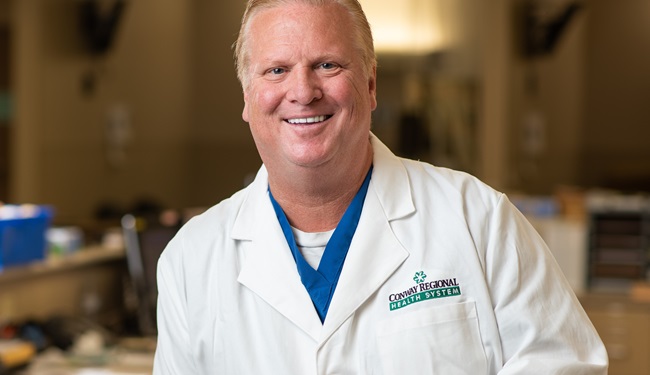GI Center's Maat is innovator
“I chose Conway because of the wonderful community and to have a better quality of living,” said Owen Maat, MD. “It was clear that Conway Regional was dedicated to developing the gastroenterology service line into the area’s best by bringing cutting-edge technology to the community. I also wanted the opportunity to work with Martin Moix, perhaps the best gastroenterologist and finest person I have ever encountered.”

After performing about 40,000 GI procedures, Owen Matt, MD, still enjoys each day of his practice.
“I believe I can best help the community by striving daily to become better as a physician I am constantly expanding my knowledge and skill set,” said Maat, a gastroenterologist with the Conway Regional Gastroenterology Center. “I enjoy the satisfaction of fixing a problem in the operating room.”
Gastroenterologists treat diseases of the digestive tract including esophagus, stomach, colon, small intestine, pancreas, gallbladder, and liver. Interventional gastroenterologists, like Maat, can perform innovative, minimally invasive endoscopic surgical procedures as well as non-surgical options. He is currently using an innovative Overstitch technology to endoscopically close defects of the stomach and colon without surgery.
Maat said the center is planning to introduce a number of new procedures in 2020 to improve GI services for north Central Arkansas, including use of endoscopic and wireless technology.
Maat has been practicing gastroenterology since he finished a fellowship at MD Anderson Cancer Center in 1997. He achieved his medical degree at the University of Texas-Galveston followed by an internship and residency in internal medicine at the University of Texas Health Science Center at Houston.
He spent about 20 years in Houston before opting for a more tranquil locale once his children were grown. His oldest son, Ford, is a senior at the Texas A&M Maritime Academy and his youngest son, Griffin, is a junior premed student at Baylor. His daughter, Jordan, is a senior voice student at Houston High School for the Performing and Visual Arts. She will enter college as a pre-med student in the fall.
“I chose Conway because of the wonderful community and to have a better quality of living,” said Maat. “It was clear that Conway Regional was dedicated to developing the gastroenterology service line into the area’s best by bringing cutting-edge technology to the community. I also wanted the opportunity to work with Martin Moix, perhaps the best gastroenterologist and finest person I have ever encountered.”
Takeaways
While Maat, Moix and the rest of the staff at the Conway Regional Gastroenterology Center are working to expand treatment options, they stress the importance of screenings.
“A colorectal screening for people over age 50 can be a lifesaver. It’s the biggest takeaway that I can give you,” said Maat. “Ninety percent of colorectal cancer can be detected with the screening.” Colorectal cancer is the third most commonly diagnosed cancer in both men and women.
In some instances colorectal symptoms can include anemia from blood loss, resulting in weakness, excessive fatigue, and sometimes shortness of breath. Additional warning signs include bleeding from the rectum, cramping or discomfort in the lower abdomen and false urges to have bowel movements.
GERD
An upper endoscopy screening is important for people with chronic acid reflux disease (GERD) because it helps gastroenterologists detect the presence of Barrett’s esophagus. Barrett’s is a condition that occurs when the cells of the esophagus are restructured due to the presence of acid reflux. Maat diagnoses about one patient per month with Barrett’s disease. “That’s a lot for Conway,” he said, encouraging people over 50 who are living with chronic GERD to discuss the screening with their family doctors.
According to Johns Hopkins Medicine, GERD is the most common gastrointestinal disease affecting more than 30 million people in North America. About 5 percent of those patients develop a second condition, called Barrett’s disease, according to Johns Hopkins.
The disease does not cause symptoms but is often associated with complications from GERD: heartburn, indigestion, blood in vomit or stool, difficulty swallowing solid fluids and the presence of bitter liquid coming up to the chest or mouth during the night. (Originally published in AY magazine)